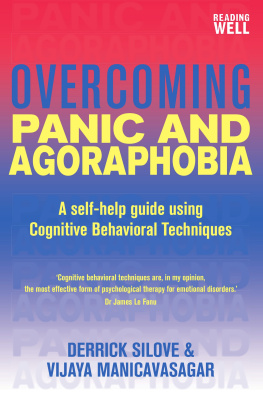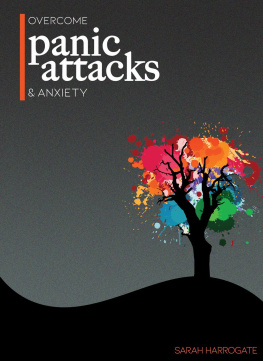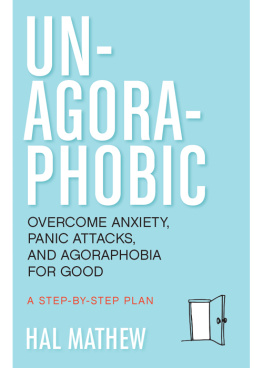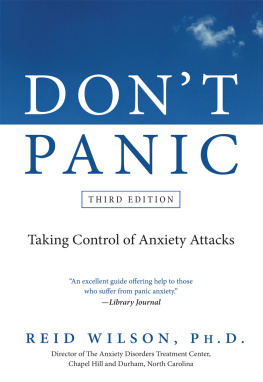PROFESSOR DERRICK SILOVE is a practising clinical psychiatrist and Director of the Psychiatry Research and Teaching Unit, School of Psychiatry, University of New South Wales.
VIJAYA MANICAVASAGAR is a senior clinical psychologist and is Research Coordinator of the Psychiatry Research and Teaching Unit of the University of New South Wales.
The aim of the Overcoming series is to enable people with a range of common problems and disorders to take control of their own recovery program. Each title, with its specially tailored program, is devised by a practising clinician using the latest techniques of cognitive behavioral therapy techniques which have been shown to be highly effective in changing the way patients think about themselves and their problems.
The series was initiated in 1993 by Peter Cooper, Professor of Psychology at Reading University and Research Fellow at the University of Cambridge in the UK whose original volume on overcoming bulimia nervosa and binge-eating continues to help many people in the USA, the UK and Europe. Many of the books in the Overcoming series are recommended by the UK Department of Health under the Books on Prescription scheme.
Titles in the series include:
OVERCOMING ANGER AND IRRITABILITY
OVERCOMING ANOREXIA NERVOSA
OVERCOMING ANXIETY
OVERCOMING BODY IMAGE PROBLEMS
OVERCOMING BULIMIA NERVOSA AND BINGE-EATING
OVERCOMING CHILDHOOD TRAUMA
OVERCOMING CHRONIC FATIGUE
OVERCOMING CHRONIC PAIN
OVERCOMING COMPULSIVE GAMBLING
OVERCOMING DEPERSONALIZATION AND FEELINGS OF UNREALITY
OVERCOMING DEPRESSION
OVERCOMING DEPRESSION: TALKS WITH YOUR THERAPIST (AUDIO)
OVERCOMING GRIEF
OVERCOMING INSOMNIA AND SLEEP PROBLEMS
OVERCOMING LOW SELF-ESTEEM
OVERCOMING MOOD SWINGS
OVERCOMING OBSESSIVE COMPULSIVE DISORDER
OVERCOMING PANIC
OVERCOMING PARANOID AND SUSPICIOUS THOUGHTS
OVERCOMING PROBLEM DRINKING
OVERCOMING RELATIONSHIP PROBLEMS
OVERCOMING SEXUAL PROBLEMS
OVERCOMING SOCIAL ANXIETY AND SHYNESS
OVERCOMING TRAUMATIC STRESS
OVERCOMING WEIGHT PROBLEMS
OVERCOMING WORRY
OVERCOMING YOUR CHILDS FEARS AND WORRIES
OVERCOMING YOUR CHILDS SHYNESS AND SOCIAL ANXIETY
OVERCOMING YOUR SMOKING HABIT
All titles in the series are available by mail order.
Please see the order form at the back of this book.
www.overcoming.co.uk
OVERCOMING
PANIC AND
AGORAPHOBIA
A self-help guide using
Cognitive Behavioral Techniques
DERRICK SILOVE
AND
VIJAYA MANICAVASAGAR
Robinson
LONDON
Constable & Robinson Ltd
5556 Russell Square
London WC1B 4HP
www.constablerobinson.com
First published by Robinson Publishing Ltd 1997
Copyright Derrick Silove and Vijaya Manicavasagar 1997
The right of Derrick Silove and Vijaya Manicavasagar to be identified as authors of this work has been asserted by them in accordance with the Copyright, Designs and Patents Act, 1988
All rights reserved. This book is sold subject to the condition that it shall not, by way of trade or otherwise, be lent, re-sold, hired out or otherwise circulated in any form of binding or cover other than that in which it is published and without a similar condition being imposed on the subsequent purchaser.
A copy of the British Library Cataloguing in Publication Date for this title is available from the British Library.
ISBN 978-1-85487-701-7
eISBN 978-1-47210-577-6
Important Note
This book is not intended to be a substitute for any medical advice or treatment. Any person with a condition requiring medical attention should consult a qualified medical practitioner or suitable therapist.
Printed and bound in EU
10 9
Table of contents
Introduction by Professor Peter Cooper
Why a cognitive behavioral approach?
Over the past two or three decades, there has been something of a revolution in the field of psychological treatment. Freud and his followers had a major impact on the way in which psychological therapy was conceptualized, and psychoanalysis and psychodynamic psychotherapy dominated the field for the first half of this century. So, long-term treatments were offered which were designed to uncover the childhood roots of personal problems offered, that is, to those who could afford it. There was some attempt by a few health service practitioners with a public conscience to modify this form of treatment (by, for example, offering short-term treatment or group therapy), but the demand for help was so great that this had little impact. Also, whilst numerous case histories can be found of people who are convinced that psychotherapy did help them, practitioners of this form of therapy showed remarkably little interest in demonstrating that what they were offering their patients was, in fact, helpful.
As a reaction to the exclusivity of psychodynamic therapies and the slender evidence for its usefulness, in the 1950s and 1960s a set of techniques was developed, broadly collectively termed behavior therapy. These techniques shared two basic features. First, they aimed to remove symptoms (such as anxiety) by dealing with those symptoms themselves, rather than their deep-seated underlying historical causes. Second, they were techniques, loosely related to what laboratory psychologists were finding out about the mechanisms of learning, which were formulated in testable terms. Indeed, practitioners of behavior therapy were committed to using techniques of proven value or, at worst, of a form which could potentially be put to test. The area where these techniques proved of most value was in the treatment of anxiety disorders, especially specific phobias (such as fear of animals or heights) and agoraphobia, both notoriously difficult to treat using conventional psychotherapies.
After an initial flush of enthusiasm, discontent with behavior therapy grew. There were a number of reasons for this, an important one of which was the fact that behavior therapy did not deal with the internal thoughts which were so obviously central to the distress that patients were experiencing. In this context, the fact that behavior therapy proved so inadequate when it came to the treatment of depression highlighted the need for major revision. In the late 1960s and early 1970s a treatment was developed specificially for depression called cognitive therapy. The pioneer in this enterprise was an American psychiatrist, Professor Aaron T. Beck, who developed a theory of depression which emphasized the importance of peoples depressed styles of thinking. He also specified a new form of therapy. It would not be an exaggeration to say that Becks work has changed the nature of psychotherapy, not just for depression but for a range of psychological problems.
In recent years the cognitive techniques introduced by Beck have been merged with the techniques developed earlier by the behavior therapists to produce a body of theory and practice which has come to be known as cognitive behavior therapy. There are two main reasons why this form of treatment has come to be so important within the field of psychotherapy. First, cognitive therapy for depression, as originally described by Beck and developed by his successors, has been subjected to the strictest scientific testing; and it has been found to be a highly successful treatment for a significant proportion of cases of depression. Not only has it proved to be as effective as the best alternative treatments (except in the most severe cases, where medication is required), but some studies suggest that people treated successfully with cognitive behavior therapy are less likely to experience a later recurrence of their depression than people treated successfully with other forms of therapy (such as antidepressant medication). Second, it has become clear that specific patterns of thinking are associated with a range of psychological problems and that treatments which deal with these styles of thinking are highly effective. So, specific cognitive behavioral treatments have been developed for anxiety disorders, like panic disorder, generalized anxiety disorder, specific phobias and social phobia, obsessive compulsive disorders, and hypochondriasis (health anxiety), as well as for other conditions such as compulsive gambling, alcohol and drug addiction, and eating disorders like bulimia nervosa and binge-eating disorder. Indeed, cognitive behavioral techniques have a wide application beyond the narrow categories of psychological disorders: they have been applied effectively, for example, to helping people with low self-esteem and those with marital difficulties.
Next page









